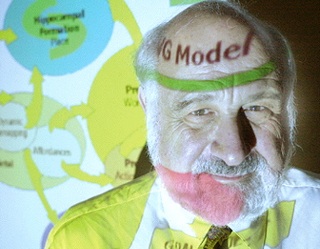Difference between revisions of "Michael Arbib"
From Cyborg Anthropology
Caseorganic (Talk | contribs) (Created page with 'Kazys Varnelis ===Currently=== Fletcher Jones Professor of Computer Science
, University Professor
and Professor of Biological S…') |
Caseorganic (Talk | contribs) |
||
| Line 1: | Line 1: | ||
| − | [[File:Michael-Arbib.jpg|300px|thumb|right| | + | [[File:Michael-Arbib.jpg|300px|thumb|right|Michael Arbib, USC Brain Project]] |
===Currently=== | ===Currently=== | ||
| − | Fletcher Jones Professor of Computer Science
, University Professor
and Professor of Biological Sciences, Biomedical Engineering, Electrical Engineering, Neuroscience and | + | Fletcher Jones Professor of Computer Science
, University Professor
and Professor of Biological Sciences, Biomedical Engineering, Electrical Engineering, Neuroscience and Psychology
Director, USC Brain Project |
===Work=== | ===Work=== | ||
Arbib has developed a new interest is working with architects to better understand the neuroscience of the architectural experience and to develop a new field of neuromorphic architecture, "brains for buildings". | Arbib has developed a new interest is working with architects to better understand the neuroscience of the architectural experience and to develop a new field of neuromorphic architecture, "brains for buildings". | ||
Latest revision as of 08:12, 21 November 2010
Currently
Fletcher Jones Professor of Computer Science , University Professor and Professor of Biological Sciences, Biomedical Engineering, Electrical Engineering, Neuroscience and Psychology Director, USC Brain Project
Work
Arbib has developed a new interest is working with architects to better understand the neuroscience of the architectural experience and to develop a new field of neuromorphic architecture, "brains for buildings". Author or editor of almost 40 books, he has most recently edited "Who Needs Emotions? The Brain Meets the Robot" (with Jean-Marc Fellous, Oxford University Press, 2005) and "From Action to Language via the Mirror System" (Cambridge University Press, 2006).
Research Topics
- Computational and cognitive neuroscience
- Mirror neurons and action recognition
- Brain mechanisms of language and their evolution
- Epistemology
- Neural networks
- Simulation
- Schema theory
- Neuroinformatics
- Neuroscience applied to architecture
